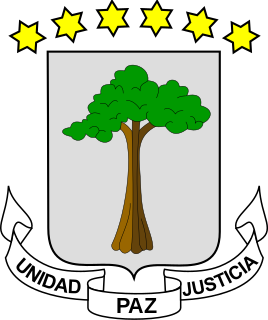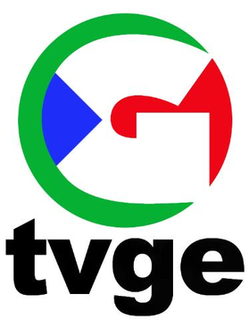
Equatorial Guinea, officially the Republic of Equatorial Guinea, is a country on the west coast of Central Africa, with an area of 28,000 square kilometres (11,000 sq mi). Formerly the colony of Spanish Guinea, its post-independence name evokes its location near both the Equator and the Gulf of Guinea. As of 2021, the country had a population of 1,468,777.

The History of Equatorial Guinea is marked by centuries of colonial domination by the Portuguese, British and Spanish colonial empires, and by the local kingdoms.

The politics of Equatorial Guinea take place in a framework of a presidential republic, whereby the President is both the head of state and head of government. Executive power is exercised by the government. Legislative power is vested in both the government and the Chamber of People's Representatives

Francisco Macías Nguema, often mononymously referred to as Macías, was an Equatoguinean politician who served as the first President of Equatorial Guinea from the country's independence in 1968 until his overthrow in 1979. He is widely remembered as one of the most brutal dictators in history.

The Bubi people are a Bantu ethnic group of Central Africa who are indigenous to Bioko Island, Equatorial Guinea. Once the majority group in the region, the population experienced a sharp decline due to war and disease during Portuguese expeditions. By the end of Spanish colonial rule in the mid 20th century, and after substantial intermarriage with newly introduced populations, such as Afro-Cubans, Krio people, Portuguese people and Spaniards, the Bubi people, again, experienced a great decline in number. Seventy-five percent perished due to tribal/clan rooted political genocide during a civil war that led to Spanish Guinea's independence from Spain. This, too, sparked mass exodus from their homeland with most of the exiles and refugees immigrating into Spain. The indigenous Bubi of Bioko Island have since co-existed with non-indigenous Krio Fernandinos; and members of the Fang ethnic group, who have immigrated in large numbers from Río Muni. Once numbering approximately 3 million, the Bubi currently number around 100,000 worldwide.

The Constitution of Equatorial Guinea is the basic document of that country. It was approved in 1991 and amended in 1995. In 2011, a referendum was held on a series of amendments.
Atanasio Ndongo Miyone was an Equatoguinean musician, writer and Fang political figure. He wrote the lyrics to Equatorial Guinea's national anthem, Caminemos pisando las sendas de nuestra inmensa felicidad. He was executed in 1969 following a failed coup to depose Francisco Macías Nguema, the first ruler of an independent Equatorial Guinea.

A constitutional referendum was held in Equatorial Guinea on 15 August 1982 following the overthrow and execution of Francisco Macías Nguema in the 1979 coup d'état. The new constitution replaced the 1973 document and appointed Teodoro Obiang Nguema Mbasogo president for seven years, as well as making provisions for the protection of human rights and limited political representation. It was passed by 95.8% of voters with a 93.5% turnout.

Equatorial Guinea–Spain relations refers to the diplomatic relations between the Republic of Equatorial Guinea and the Kingdom of Spain. Both nations are members of the Association of Academies of the Spanish Language, Organization of Ibero-American States and the United Nations.
Ángel Masié Ntutumu was an Equatorial Guinean politician.
Salvador Elá Nseng Abegue is an Equatorial Guinean military leader, politician, and diplomat.

The Popular Idea of Equatorial Guinea was a nationalist political group created at the end of the 1950s with the goal of establishing independence in Equatorial Guinea. The IPGE is considered to be the first formal Equatoguinean political party. The IPGE was founded by a group of exiles living in Gabon and Cameroon, with their official headquarters in Ambam. Early party leaders included Clemente Ateba, José Perea Epota, Antonio Eqoro, Jaime Nseng, and Enrique Nvó, who was credited for starting the IPGE during his time in exile in Ambam. Nvo's radical political ideas and his rise to power in sections of northern Rio Muni concerned Spanish authorities, who allegedly paid contract killers to assassinate him in 1959.

The United National Workers' Party was a political party in Equatorial Guinea. It was the only political party in the country from 1970 to 1979, during the dictatorship of Francisco Macías Nguema.
The Supreme Military Council — initially called the Military Revolutionary Council — was the ruling military junta and the de facto government of Equatorial Guinea between the 1979 coup d'état and the 1982 constitutional referendum.

Televisión de Guinea Ecuatorial is an Equatorial Guinean state television channel, which is part of the public media system called Radio Televisión de Guinea Ecuatorial (RTVGE).
The Treaty of Friendship and Cooperation between Spain and Equatorial Guinea is a bilateral treaty signed on 23 October 1980 in Madrid by the First Vice President and Commissioner of the Ministry of Foreign Affairs and International Cooperation of Equatorial Guinea, Florencio Mayé Elá and the Minister of Foreign Affairs of Spain, José Pedro Pérez-Llorca. The treaty was published in the Boletín Oficial del Estado on 27 July 1981.

The Constitution of Equatorial Guinea of 1968, was promulgated with a view to the independence of the Republic of Equatorial Guinea on October 12, 1968. It is the first Constitution promulgated in Equatorial Guinea, in addition to being a text that enshrines liberal democracy, popular sovereignty, freedom of religion and the right of self-determination, when in Spain it is still the regime of Francisco Franco was in force.
Bonifacio Nguema Esono Nchama was an Equatorial Guinean politician and military man, known for having been Vice President of Francisco Macías and Minister of Foreign Affairs and International Cooperation.
The following lists events that happened during 1979 in the Republic of Equatorial Guinea.

The 1982 Constitution of Equatorial Guinea was the country's third constitution. Following the 1979 military coup that removed Francisco Macías Nguema from the presidency, a popular referendum obtained 95.8% of votes in favor of the new Constitution in August 1982. The Constitution, which the United Nations helped draft, added provisions for human rights, outlined a new free-market economy for the country, and nominally restored national elections.









